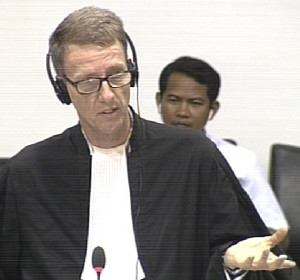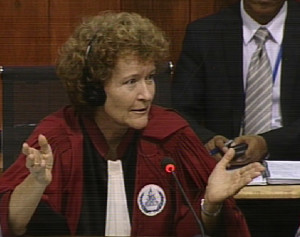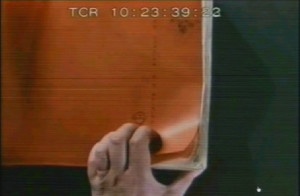‘I don’t recall’, Motto of Hindering Day for the Defense
Today’s hearing seemed to be a discouraging one for Mr. Victor Koppe, Co-Defense Lawyer for Nuon Chea. Faced with a witness who did not seem to know the information he wanted, Mr. Koppe had no choice but to rely on a myriad of documents and previous testimonies, which made him difficult to follow. Fending off interjections and remarks both by Judge Jean-Marc Lavergne, Judge Claudia Fenz and the Senior Assistant Prosecutor Mr. Vincent de Wilde, Mr. Koppe was nonetheless able to extract some information about the hierarchical structure at S-21.
Defense fails to get tangible answers from the witness
The interrogation of witness Suos Thy continues, with Co-Defense Lawyer Victor Koppe sailing the boat this time. After introducing the witness and notifying the tribunal that Nuon Chea was following the proceedings from his cell, Mr. Koppe rose to his feet and announced that he would refer to a certain number of documents throughout the day. The witness was given a binder with these documents. The first subject Mr. Koppe wanted to talk about was Mr. Thy’s previous interrogations.
You said you were imprisoned in the 1980s and spent about four years in prison. Were there any conditions to your release?
I was to be a good citizen.
Mr. Koppe then reminded the witness that he had spoken to DC-Cam (the Documentation Center of Cambodia), several journalists and film-makers and investigators of this Court – did he remember also speaking to U.S. military personnel? Even after the Co-Counsel made reference to two instances, 2002 and 2007, when the witness had apparently spoken to Intelligence Officers from the U.S. Department of Defense, he did not recall the events[1]. M. Thy however did remember he was interviewed by a Military Court in 1999, but did not recall whether it was against Duch or not[2]. He confirmed his statement from that time, that there was a “special prison for the higher ranked people; outside and south of S-21”.
Mr. Koppe then referred to the time when the witness was severely wounded, and then became part of the medical staff of his battalion. Mr. Suos Thy stated that he provided first aid to injured soldiers before they were sent for further care. Engaging in the subject of blood draws performed under the regime, Mr. Koppe asked the witness if he knew about a policy that soldiers wounded on the battlefield would receive blood in order to recuperate. Even after hearing heavily incriminating testimonies about plans to draw blood from civilians across Cambodia [3], the witness answered: “I was not aware of such a policy. On the battlefield, there was no medicine, no syringes, usually only bandages”.
Better understanding the hierarchical structure at Tuol Sleng
Showing the witness a list of names that people who joined the first general staff study session in October 1966, Mr. Koppe asked whether he recognized the persons on that list. He did, including Duch, Hor, Huy, Snoeung (part of the Guard’s Unit), and Meng (chief of the office in charge of interrogation section)[4]. The witness had no recollection of what “Office 26” referred to[5].
Attempting to get information on a document showing the rice consumption plan for all divisions and all regiments, Mr. Koppe remained empty-handed[6]. He kept citing various divisions in vain, including Division 703, of which the witness had been a part of. Mr. Koppe was only able to refer to a 2006 interview by the Prosecution, in which Mr. Thy stated that Division 12, former Division 703, was composed of four distinct brigades[7]. Mr. Suos Thy departed from that interview however, in saying that the Commander of Division 12 was Ta Nath, and Huy was the Commander of Division 112. The President chose this moment, after an interjection by Judge Lavergne, to mark a brief pause.
S-21, Duch and Hun Sen
Since the beginning of the witness’s testimony, lawyers and judges alike seemed to believe that his strategic list-keeping position, though low in rank, meant that the witness came across crucial information. However, the pathway to the evidence seemed drowned in an ocean of previous depositions, including some made by himself, lists and records that the witness could not remember. Once again, Defense Co-Counsel failed to obtain substantial details about the functioning of S-21. He focused on statements made about Duch, only able to have the witness state that Duch ranked similarly to a Divisional Commander at S-21[8].
Mr. Koppe then went ahead and asked about Hun Sen’s involvement under the Democratic Kampuchea regime.
Mr. Witness, do you know who the Prime Minister is?
The Prime Minister is Mr. Hun Sen.
Do you know if he had any military position during the Democratic Kampuchea regime?
I don’t recall.
Mr. Koppe confronted the witness with two quotes from Duch concerning Hun Sen’s military rank[9] and the essential function of S-21, which Duch defined as “equivalent to a district committee for re-education, distant from higher level”[10]. Mr. Koppe, still trying to establish with certainty who was at the head of S-21 and at what time, questioned Mr. Suos Thy about the relation between Regiment 703 and Division 21, and more specifically how many people from Division 21 came from Regiment 703. The witness could not confirm the statement made by Duch in front of the military court that “95% of S-21 Cadres came from 703”[11].
S-21 was under the command of Ta Nath who was from Regiment 703, he would have selected the cadres from 703, but I don’t not know how many there were.
Mr. Witness, Cadres like Him Huy, Peng, Hor, Meng are all from Regiment 703, correct?
Yes.
The witness was then unable to answer Mr. Koppe’s further inquiries as to whether Duch or Ta Nath was at the head of S-21 in 1976[12]. Moving on to the days preceding the arrival of the Vietnamese troops, Co-Counsel Koppe wanted to know if there were any orders given to destroy the documents that were at S-21, and if Duch stored documents in a separate storage room outside S-21.
I don’t recall.
Superiors and superior orders
After Co-Prosecutor Vincent de Wilde interjected, Mr. Koppe was backed by the witness when citing another testimony from earlier this year, which affirmed that Son Sen came to address a study session[13].
Mr. Koppe then asked a series of questions aiming at showing that S-21 was part of the military, which the witness confirmed repeatedly[14]. While it was apparent Mr. Koppe wanted the witness to corroborate the idea that Duch did not have an authority as strong as alleged by other parties, Mr. Suos Thy calmly reiterated that his direct superior, Hor, did not carry out any operation that was not an order from Duch[15]. Mr. Koppe kept on hammering document after document[16], leading the Prosecution Lawyer to stand up and chisel in:
I would appreciate if my colleague would ask open questions, instead of trying to save time.
The minute Mr. Koppe failed to cite a document reference, Judge Fenz did not miss the opportunity to cut him off and request it. Judge Fenz had already made a few remarks throughout the day. Slightly disconcerted, Victor Koppe paused, breathing in, and asked as softly as he could bear if it were possible that he “at least finish [his] sentence?”, before muttering a scathing “God Almighty”, audible to all.
The verification questions went on. Mr. Suos Thy did not give what Mr. Koppe was hoping for: he could not say a word about S-21 mainly being a counter-espionage facility[17] and contradicted a statement by Duch, who said there were no civilians at S-21[18]. That did not help the credibility of Duch’s testimonies quoted by Mr. Koppe a few times today, and it was one of the few answers the witness was able to provide. He reaffirmed that Meng was the one who drafted the “master lists” or “compiled lists”, at least from the Interrogation Unit[19].
This session ended in a small joust between Mr. Koppe and Judge Lavergne over a book of records visible in an extract of “Die Angkar” (1981)[20]. Mr. Koppe’s objective was to show there was a difference between the state of the documents from the evidence list and how they were at the time of S-21. The movie showed a thick, orange book with handwritten notes. Judge Lavergne interjected twice, making a point to specify that this book contained the statistics of prisoners who came in and out of S-21 and not a list of actual prisoners. Though the witness seemed to hint that he was in charge of such a book, he went back on it and said he only used this specific book when he had to total the number of prisoners.
The President then announced the last break of the day.
The rice fields
Mr. Koppe showed the witness a document entitled “List of Prisoners Released from Division 920”[21]. Mr. Suos Thy said that to his knowledge, this was not an S-21 list, because he did not recall anyone being released. “It must be from an external unit”, he added. Building upon two biographies from the OCIJ list, the Co-Counsel for the Defense asked the witness whether he had any knowledge of any prisoners being sent to work in rice fields[22]. Though the witness was able to say that “rice fields” referred to S-21 D, he did not recall anything about prisoners being sent there. Mr. Koppe interrogated him about the rice fields of Prey Sar (S-24), which proved unsuccessful.
Mr. Koppe then navigated through questions to link the photography unit at S-21 to the rice fields. The witness recalled the name Nhim Kim Sreang, the head of the photography department, and two assistant photographers, Song and Sreang. Sreang had previously testified that after some prisoners had their photo taken at S-21, they were sent to the rice fields[23]. Mr. Suos Thy knew nothing about this either. Mr. Suos Thy was then shown a set of photos[24], and despite Mr. Koppe’s insisting questions, he had no idea about the process related to the numbers on each prisoner and was not aware of the numbering system, which was the photographers’ task.
Kampong Chhnang Airport Construction Site
The last line of today’s interrogation was not any different than the rest. Mr. Suos Thy, arguing the time factor and memory losses, could not remember much. He had no recollection of hearing anything about combatants being sent to reeducation purposes at Kampong Chhnang Airport Construction Site[25], even after Mr. Koppe made many references to try and trigger the witness’ memory.
He was able to tell Mr. Koppe that two documents from S-21 were not drafted by him, as they included a column entitled “crime category”, which he never had on his forms.[26] The last set of documents presented by the Defense Lawyer was three documents to be read together, as all three had the same name listed on them[27]: Hun Chem In, alias Xi Ta (phonetics). The witness had no recollection of this name or why the same name would be on three different lists.
On this puzzling note, the President adjourned the hearing of witness Suos Thy. It will resume on Tuesday, June 7th at 9 am.
[1] E3/7845, at 00742362 (KH), 00276837 (EN), 00778926 (FR) (in which the witness had stated that “about 2 months before the Vietnamese forces arrived, all the prisoners from Tuol Sleng were moved to the West”, but he did not recall saying it) and at 00742360 (KH), 00276838 (EN), 0078925 (FR).
[2] E3/10568, at 00320756 (KH), 00326773 (EN), 00326776 (FR).
[3] E3/226, at 00017158 (KH), 00183372 (EN), 00296166 (FR): June 1976, attempt to collect blood from people all over the country, testimony from a meeting of Health and Social Affairs, presumably with members of the standing committee.
[4] E3/8365.
[5] E3/1585, at 00095532 (KH), 00897665 (EN), 00611652 (FR).
[6] E3/1136, at 00160081 (KH), 00548764 (FR), 00543743 (EN).
[7] E3/9140, at 00181059 (EN) and 00181061 (EN).
[8] E1/62.1, 15h33, statement by Duch. E3/5752, at 00145457 (EN), 00145434 (KH).
[9] E3/106, at 0177625 (KH), 00177645-646 (FR), 00177635 (EN): “Hun Sen had the same rank as me, regiment commander but he had combatants”.
[10] E3/178, at 00178035-36 (FR), 0178023, Khmer ERNs ending at 0014.
[11] D/288/6.52/4.40, at 00329399 (EN), 00095680 (KH), 00329405 (FR).
[12] E3/1038, at 00008144 (KH), 0008147 (EN), 00280874 (FR).
[13] E3/9140, at 00181082 (EN and KH): Lach Mean’s testimony on 26/04/2016, at 14”29.
[14] E3/2028, at 00185219 (EN), 00021084 (KH) and E3/2100, at 00019233 (KH), 00855374 (EN), 00848707 (FR).
[15] E3/9140, at 00181096, 98 and 99 (EN and KH); and E3/452, at 00146554 (EN), 00147567-68 (KH), 00147930 (FR). E3/1570: Sung Sari, alias Brav, who was executed although his interrogation had not finished yet. Duch said that “Hor made the decision. Hor was more autonomous.” To Mr. Koppe, this was an incident that showed Duch did not make all the decisions regarding executions. Koppe: “Duch only advised Hor once the interrogations were finished. Correct?” Witness: Hor had to get authorization from Duch.”
[16] E3/5748, at 00153568 00153445 (EN), (FR), 00153459 (KH); E3/1570, at 00154223 (KH), 00154193 (EN), 00154208 (FR); E3/1376; E3/1465; E3/452, 00146559 (KH), 00147567 (EN), 00147929 (FR); E3/10571, Investigators of the international co-investigators, question 7.
[17] E3/451, at 00187652 (KH), 00234341 (EN), 006171 (FR): Duch. 9/4/2012, 15h35.
[18] E3/5772, 00209178 (KH), 00186194 (EN), 00186210 (FR).
[19] [E3 reference missing] 0080613 (KH), 00775890 (EN), 00276844 (FR).
[20] E3/3059R, from 23”58-25”15.
[21] E3/8648, at 00292816 (EN), 00288471 (KH), 00303515 (FR).
[22] E3/10555, at 01219685-87 (KH); numbers 14886 and 14888 on the OCIJ list.
[23] E3/7639, at 00162710 (KH), 00162736 (EN), 00338079 (FR): “Sreang recalls an incident: “one day, when I was developing, photos were damaged. When I requested to retake the photos, I could only find two. I asked Duch, and he said they were at the rice fields, go photograph them at the rice fields”.
[24] E3/9214, 435 photos. Second set of photos starting at P01223764.
[25] E3/9320, at 000520321 (KH), 00337986 (p.20) (EN), 00280530 (FR).
[26] E3/8761, at 000090284 (KH) and E3/2100: on the list: person n°20 (Sao Ken, alias Vun, age 30, “Office 24 chairman, S-21 D”) and n°21 (Bout Heng, “documentation team leader of S-21”).
[27] E3/9898, at 01011226 (KH), 24/10/1978 (Prisoners from the North East Zone); E3/9897, at 01011214 (KH), 24/10/1978; E3/2251, at 010116783 (KH), 24/10/1978.
Featured image: Suos Thy (DC-Cam)



